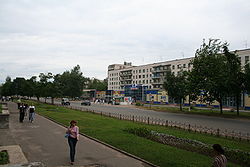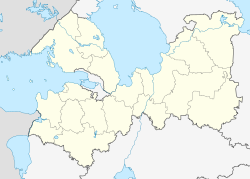Tikhvin
| Tikhvin (English) Тихвин (Russian) |
|
|---|---|
| - Town - | |
 Karla Marksa Street, the longest in Tikhvin |
|
 Location of Leningrad Oblast in Russia |
|
|
|
|
|
|
|
|
|
|
| Town Day | July 9 |
| Administrative status (as of June 2013) | |
| Country | Russia |
| Federal subject | Leningrad Oblast |
| Administrative district | Tikhvinsky District |
| Settlement municipal formation | Tikhvinskoye Settlement Municipal Formation |
| Administrative center of | Tikhvinsky District, Tikhvinskoye Settlement Municipal Formation |
| Municipal status (as of May 2010) | |
| Municipal district | Tikhvinsky Municipal District |
| Urban settlement | Tikhvinskoye Urban Settlement |
| Administrative center of | Tikhvinsky Municipal District, Tikhvinskoye Urban Settlement |
| Statistics | |
| Population (2010 Census) | 58,459 inhabitants |
| - Rank in 2010 | 284th |
| Time zone | MSK (UTC+03:00) |
| First mentioned | 1383 |
| Town status since | 1773 |
| Previous names |
Predtechensky pogost, Tikhvinsky posad |
| Postal code(s) | 187549–187553, 187555–187557 |
| Dialing code(s) | +7 81367 |
| on | |
Tikhvin (Russian: Ти́хвин) is a town and the administrative center of Tikhvinsky District in Leningrad Oblast, Russia, located on both banks of the Tikhvinka River in the east of the oblast, 200 kilometers (120 mi) east of St. Petersburg. Tikhvin is also an industrial and cultural center of the district, as well as its transportation hub. Population: 58,459 (2010 Census);63,338 (2002 Census);71,352 (1989 Census).
The name of the town originates from a combination of two words from the Veps language: "tikh" and "vin" mean "road" and "market" respectively; i.e., road to the market. The town is located on an ancient commercial river way.
It was first mentioned in 1383 as Predtechensky pogost (Предтеченский погост), when a chronicle reported that a wooden Church of the Dormition was built here. Later, in 1495-1496, Y. K. Saburov, a clerk in the Novgorod Cadastre, mentioned the "...Tikhvin parish and in it, a wooden church..."
Its location at the intersection of trade routes which connected the Volga River with Lake Ladoga and the Baltic Sea ensured its rapid development. At the beginning of the 16th century it was already a widely known commerce and trade center. In 1507-1515, funded by prince Vasily III of Moscow, on the spot of the burned wooden church, Dmitry Syrkov of Novgorod constructed the monumental stone Cathedral of Dormition, which stands to this day.
...
Wikipedia



